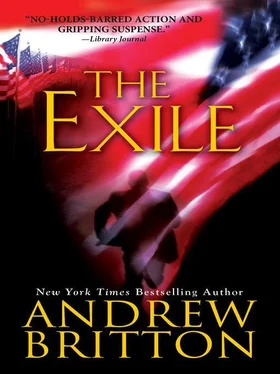Andrew Britton - The Exile
Здесь есть возможность читать онлайн «Andrew Britton - The Exile» весь текст электронной книги совершенно бесплатно (целиком полную версию без сокращений). В некоторых случаях можно слушать аудио, скачать через торрент в формате fb2 и присутствует краткое содержание. Жанр: Триллер, на английском языке. Описание произведения, (предисловие) а так же отзывы посетителей доступны на портале библиотеки ЛибКат.
- Название:The Exile
- Автор:
- Жанр:
- Год:неизвестен
- ISBN:нет данных
- Рейтинг книги:5 / 5. Голосов: 1
-
Избранное:Добавить в избранное
- Отзывы:
-
Ваша оценка:
- 100
- 1
- 2
- 3
- 4
- 5
The Exile: краткое содержание, описание и аннотация
Предлагаем к чтению аннотацию, описание, краткое содержание или предисловие (зависит от того, что написал сам автор книги «The Exile»). Если вы не нашли необходимую информацию о книге — напишите в комментариях, мы постараемся отыскать её.
The Exile — читать онлайн бесплатно полную книгу (весь текст) целиком
Ниже представлен текст книги, разбитый по страницам. Система сохранения места последней прочитанной страницы, позволяет с удобством читать онлайн бесплатно книгу «The Exile», без необходимости каждый раз заново искать на чём Вы остановились. Поставьте закладку, и сможете в любой момент перейти на страницу, на которой закончили чтение.
Интервал:
Закладка:
He had fully expected a posting to Iraq, and for a while, it had looked like that was where he was headed. Then, while he was attending the company’s two-week training course outside the Great Dismal Swamp in Moyock, North Carolina, Blackwater had inked a lucrative deal with the South African government to provide protection for President Jacob Gedleyihlekisa Zuma and senior members of his party, the African National Congress. The company’s executives immediately began shifting resources, and one week after his training had finished, Whysall had found himself on a plane to Johannesburg. Much to his surprise, he had been met at the airport by the head of the PSD, or protective security detail, to which he was assigned. His surprise at this unexpected courtesy, however, had turned to sheer disbelief when he realized who the man standing in front of him actually was.
Whysall suspected he knew as much as anyone else about Ryan Kealey, and that wasn’t much. But it was enough. The former army officer had served in the 3rd Special Forces Group from 1995 to 2001, ending that assignment-his last in the U.S. Army-with the rank of major. Prior to that, he had served with the 10th SFG at Fort Carson, Colorado. It was said that he had been assigned to the elite 1st SFOD-Delta as well, though unsurprisingly, no one could verify that particular rumor. What was better known was the man’s accomplishments over the past several years, during which time he had worked for the Central Intelligence Agency as an independent contractor.
Whysall was not easily impressed, but Ryan Kealey’s resume was beyond remarkable, and he had been gratified to learn that he would be working under the man in Johannesburg. During his time at the Blackwater facility in Moyock, Whysall had come to question the standard to which the incoming recruits were trained. Contrary to popular belief, not all of Blackwater’s security people were former members of the SF community. In fact, some of them had no military experience whatsoever. Still others had highly questionable backgrounds. One man Whysall had trained with at the Moyock facility was Chilean, and there were whispers that he had served under the brutal regime of Augusto Pinochet during the late eighties.
Still, Whysall had been relieved to find that the PSD to which he was assigned in Johannesburg had none of those problems. Regardless of whether or not the stories about Kealey were true, there was no denying the fact that the man knew how to run a protective detail. This in itself was nearly enough to confirm for Whysall that Kealey had, in fact, been a Delta operator, as close-quarter protection wasn’t part of the training program in any other branch of the military, save for the Marine Security Guard, which was assigned to U.S. embassies around the world, as well as the White House itself.
A loud roar from inside the courtroom jarred the former marine back to the present, and he felt a moment of shame for allowing his attention to wander. Straightening, he studied the doors leading into the main chamber and wondered what had just taken place inside. He checked his watch quickly and decided that it was too soon for the verdict to have been read. On the other hand, he doubted that the jury would be out for much longer, as the case was all but open and shut, which explained why he was there to begin with, along with seven other members of President Zuma’s Blackwater security detail.
David Joubert, the man currently on trial, had been Zuma’s close friend, business associate, and right-hand man when he was deputy president of South Africa under the previous administration, headed by Thabo Mbeki. Though they were fellow Xhosa tribesmen whose relationship went back to Zuma’s childhood, Zuma had disassociated himself from Joubert shortly after the National Prosecuting Authority, South Africa’s leading judicial body, had charged Zuma with two counts of corruption in 2005, adding fraud, racketeering, and money laundering a couple of years later-allegations that had clung to him even after he won the presidency four years later, ousting Mbeki from the post he’d held since Nelson Mandela left office.
In the eyes of many, including Whysall himself, Joubert was a sacrificial lamb. The intractable poverty and joblessness that beleaguered South Africa-and the entire continent-often led to the fortunes of African politicians turning on a dime. Before his parliamentary election Zuma had been a populist icon, the man who’d gained the backing of organized labor and vowed to bring new business and employment to the nation. But Whysall had been in enough of the world’s poorer countries to know that hope and desperation blinded people to the stains on their chosen savior’s robes.
The charges against Zuma stemmed from his association with Schabir Shaik, a Durban businessman who had been convicted of bribing senior officers in the South African Navy in order to win several lucrative contracts, including the construction of four Valour-class frigates valued in excess of one and a half billion rand, or a hundred fifty million euros, apiece. Additional charges linked Shaik-and, by extension, Zuma-to a French arms company. In that instance, the NPA claimed that Shaik had accepted bribes for military contracts on behalf of Zuma, who was alleged to have unwisely proceeded to launder the money through some of South Africa’s largest banks. Ultimately, Schabir Shaik was sentenced to fifteen years in prison, and shortly thereafter, the National Prosecuting Authority had started to collect the evidence it would need to formally indict Jacob Zuma.
That had been four years earlier, and the problem lay in what had occurred since. Despite having been accused and barely acquitted of rape before his election, Zuma had found a solid base of support in South Africa’s far left, which had grown disillusioned with Mbeki’s habit of ignoring views that conflicted with his own, as well as his steadfast refusal to address the needs of the nation’s vast lower-class community. Zuma’s popularity was so great that the ANC had voted him in as its new party head in 2007, effectively putting an end to Thabo Mbeki’s grasp on the presidency. The only problem had been the assortment of charges levied against Zuma, and they were dismissed on grounds of prosecutorial misconduct, finally clearing his path to power.
Whysall could not have said whether the dismissal had come on a legitimate, if convenient, technicality or quiet disclosures that Mbeki had been pressuring the NPA to disgrace and imprison his chief competitor. Both were rumored, but he was not inclined to plunge into the quagmire of African politics for the truth. He knew, and wanted to know, only as much as was necessary to do his job.
What he knew now was that the same constituency that boosted Zuma to the top had grown disillusioned less than a year into his first term of office. Winter in South Africa lasted from May through September, and the last had been marked with especially cruel, frigid weather. With millions homeless, and millions more living in un-heated shacks, there had been walkouts by chemical, construction, and municipal workers demanding higher wages for themselves-and better housing for their families. As the strikes caused industry to grind to a halt, and unrest spread across the nation, Zuma had returned to his home province of KwaZulu-Natal to implore his most faithful supporters to remain patient with him.
It was no surprise when the corruption allegations resurfaced. Zuma’s recurring problems represented new openings for his opposition. If he were again bogged down in legal proceedings, his career as president, one on which many others staked their own careers and reputations, would grind to an abrupt and final halt…and so would the government, at perhaps the worst of times. In the end it would be the South African people who suffered most from all the political and judicial machinations.
Читать дальшеИнтервал:
Закладка:
Похожие книги на «The Exile»
Представляем Вашему вниманию похожие книги на «The Exile» списком для выбора. Мы отобрали схожую по названию и смыслу литературу в надежде предоставить читателям больше вариантов отыскать новые, интересные, ещё непрочитанные произведения.
Обсуждение, отзывы о книге «The Exile» и просто собственные мнения читателей. Оставьте ваши комментарии, напишите, что Вы думаете о произведении, его смысле или главных героях. Укажите что конкретно понравилось, а что нет, и почему Вы так считаете.










